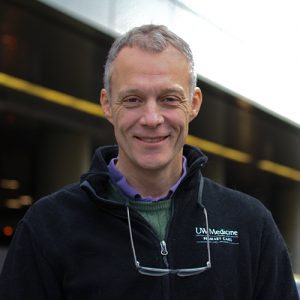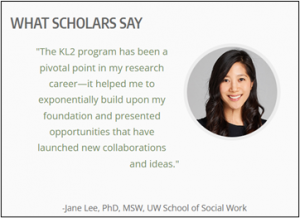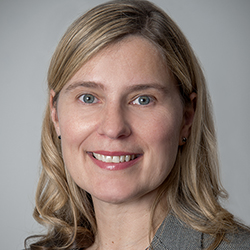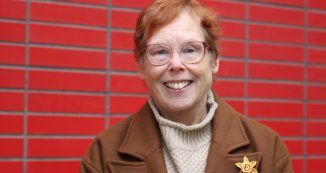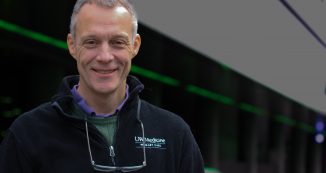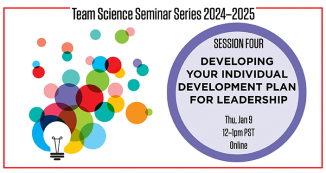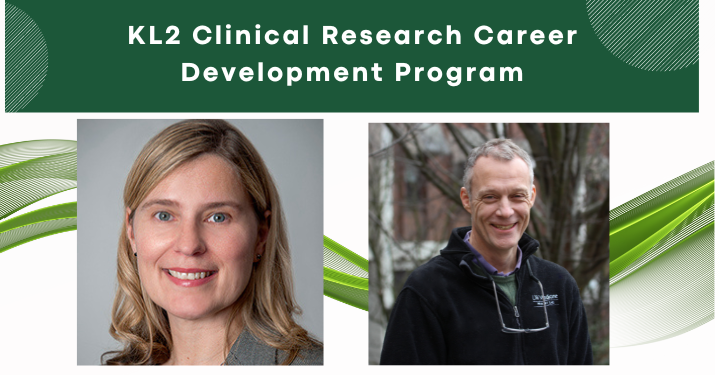
06 Mar ITHS Profile: KL2 Career Development Program
The ITHS interview series is meant to shine a deserving spotlight on individuals who are doing critical work across the vast spectrum of translational science. In this case, we are shining the light on our brilliant KL2 Multidisciplinary Clinical Research Career Development program, as well as the leaders who have made this program so successful. The timing is perfect, as Christy McKinney, PhD, MPH will be taking the lead as co-director, as John Amory, MD, MPH, MSc, takes on the role of Principal Investigator at ITHS.
We sat down with both Dr. McKinney and Dr. Amory to discuss what they love about the KL2s, and what kind of legacy they want to create.
Thank you so much for sitting down to speak with us today!
JA: Happy to! This is a favorite topic of mine.
CK: Yes, any chance to talk up the KL2s, we’ll take it.
John, can you provide a brief overview of your role as the co-director of the KL2 program?
JA: My role as the co-director of the KL2 program brought me pure joy. We have the opportunity to support individuals during their transition from the completion of their training to their early years as faculty members. The main objective of the KL2 program is to assist new assistant professors or senior postdocs in securing their first appointment, establishing their research endeavors, and acquiring the necessary training to progress to their next funding award.
What kind of guidance does this program provide that is the most valuable to the scholars in this period of their careers?
JA: This program plays a crucial role in providing a supportive community and offers guidance in areas such as grant writing and refining research presentations, papers, and proposals to increase their chances of securing funding. Our aim is to equip these talented individuals with the skills and resources they need to succeed as independent and funded investigators in their scientific careers, which can be quite challenging, particularly in obtaining research grants. The goal of the KL2 program is to take people who are brand new assistant professors or very senior postdocs and get them that first appointment.
Christy, what’s it like to be taking on this new role?
CK: Well, one of my role models has really been John Amory in terms of support and inspiration. He’s been the director and someone I’ve worked with closely over the last seven years and it’s incredible to see how he helps early career faculty develop. These are big shoes to step into.
It’s really an extension of what I really enjoy doing, which is helping the next generation develop into independent investigators. It’s been one of the highlights of my career, seeing the fantastic outcomes from our KL2 scholars and just the amazing work that they’ve been able to accomplish in a short time. It takes a long time from K to R to impact, but just the amount of accomplishments that our KL2 scholars have managed to achieve has just been great.
What are some of your favorite aspects of this program?
CK: I like being part of a program that aims to develop transitional scientists because it is what we need to move the needle on discoveries and that will change human health. Being part of this program that really aims to create the fluency of our next generation to work with people that are truly different than what they do and to work in a team science fashion — it seems like we’re making an impact for sure. I’d like to keep growing in that direction.
Do you anticipate program growth in the future?
CK: Ideally, I envision the program expanding its capacity by increasing the number of available spots and sustaining its growth. As the fields of medicine and science continue to evolve and become more complex, we will require a well-trained cohort of individuals who can navigate these advancements. Looking ahead, it would be worth discussing with funding agencies the possibility of expanding resources for the program. With a substantial pool of applicants across all six schools, there is a clear demand for the KL2 program. We need to nurture a pipeline of skilled translational investigators, and this program plays a crucial role in ensuring their development. It is my hope that the KL2 program can continue to meet this need and contribute to the future success of translational research.
Who is joining the leadership team now – we’ve heard you have some excellent new folks on the team.
JA: We are welcoming Dr. Nana Minkah as the new Assistant Director of the KL2 Program. Dr. Minkah is an Assistant Professor and Principal Investigator at the Center for Global Infectious Disease Research at Seattle Children’s Hospital. He has R01 funding for his work aimed at the development of novel vaccines for the treatment and prevention of malaria and will bring his expertise in basic translational research to the group.
CK: And we are thrilled to be welcoming Dr. Mandy Fretts to our KL2 Distinguished Faculty team. She is an Associate Professor in the Department of Epidemiology at the University of Washington School of Public Health. She is a cardiovascular epidemiologist with a focus on observational and interventional research aimed at improving cardio-metabolic health in underserved and rural communities. Her research interests include nutrition, physical activity, fatty acids, diabetes, and American Indian health – we are thrilled to have her.
John, do you have any words of wisdom for Christy as you start your new adventure as ITHS PI?
JA: Only that I won’t be far away! I’ll still poke my head into the monthly meetings when I can – staying connected to this program is important to me going forward.
And Christy, do you have any final thoughts about the future of the KL2 program?
CK: We want to continue to create a legacy of amazing translational scientists that benefit not only the University of Washington, but our partner institutions in the WWAMI region and our local collaborators at Seattle Children’s, Fred Hutch and beyond. I couldn’t be more excited to get started!
# # #
Christy McKinney, PhD, MPH is an Associate Professor in Craniofacial Medicine, Pediatrics in the School of Medicine and an Adjunct Associate Professor in Oral Health Sciences, School of Dentistry. She is also an investigator in Seattle Children’s Research Institute’s Center for Child Health, Behavior and Development, and in the Seattle Children’s Hospital Craniofacial Center. She received her PhD (2006) in epidemiology from the University of Washington.
John Amory is a renowned researcher in the field of male contraception. In addition to his role at ITHS and as a researcher, Dr. Amory is also a physician at the General Internal Medicine Center at the University of Washington Medical Center, a professor of medicine at the University of Washington, and the section head of General Internal Medicine at the University of Washington. In our July installment of this series, we profiled Dr. Amory’s work on male contraception.
The ITHS KL2 program provides the time, funding, mentorship, and training necessary to foster the early career development of post-doctoral clinical and translational researchers. KL2 Scholars are appointed for up to three years of support. The program encourages all types of clinical research, including patient-oriented research, translational research, small- and large-scale clinical investigation and trials, epidemiologic and natural history studies, health services research, and health behavior research. If you would like to learn more about the program and the application process, please visit our KL2 webpage.




